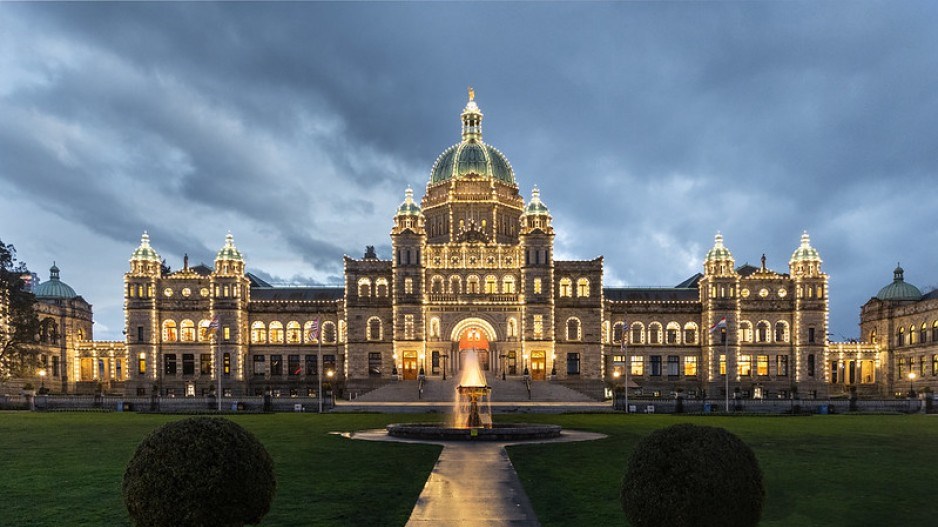B.C.’s legislature resumes this week with a throne speech full of promises and a budget full of numbers — neither of which it would be wise to put much trust in, with an election just a few months away.
Premier David Eby’s New Democrats will start the legislative session late, and finish early. Amidst that truncated timeline, the government says it intends to introduce 20 bills. That’s a rate of new legislation at least every second day.
Some things we know are coming, such as a new two-year real estate flipping tax and a bill to allow government to sue social media companies for harms. Both are measures that the NDP intends to package in its election campaign as protecting British Columbians against speculators in real estate, and predators online.
Whether either law actually improves the stated problem of housing affordability and online bullying and sextortion, will be a question only answerable after the Oct. 19 election.
“The focus of the session is going to be what British Columbians have told us should be the focus, which is housing, healthcare, looking to address the cost of living challenge people are facing, and addressing the safety of kids,” said NDP house leader Ravi Kahlon.
“It will be very busy.”
This first week has earned the nickname inside the legislature as “the week from hell” due to the NDP’s insistence on delivering a throne speech and budget within three days of one another. Normally they are separated by two weeks of debate.
This new rushed format is a first. Kahon said it’s because there’s so little time to accomplish so much work. But New Democrats set the calendar. They chose to start more than a week late, and end two weeks early. Opposition parties see an arrogant government running roughshod over transparency and debate.
“We already see them going around sprinkling announcements all over the place and it’s very clear David Eby is in campaign mode now,” said BC Green house leader Adam Olsen.
“I think some of the bills are just going to be them rushing ideas they’ve had to the finish line.
“It doesn’t make for good governance. It maybe makes for decent politics if what you are looking to do is win elections.”
That is exactly what the BC NDP is looking to do. As is BC United, which will try and balance between criticizing government’s ideas and slowly rolling out its own counter proposals during the 10-week session.
“It’s good to get into the legislature and hold government accountable, but it’s increasingly exciting to be presenting, in a positive manner, the road map we believe will inspire British Columbians to see there’s a better way to do a lot of this stuff,” said United house leader Todd Stone.
“We’re going to continue to put into the window for the people of British Columbia the priorities they could expect from a Kevin Falcon-led government. This forthcoming year now is all about the different parties presenting their ideas so that, increasingly, voters can compare and contrast.”
This session is perhaps the worst time in the four-year cycle of a government to introduce serious policy measures for debate. But the NDP have stumbled backwards into doing just that, with a promised bill to amend the Land Act to include Indigenous governments as co-statutory decision makers on Crown land.
Many land tenure holders are worried about First Nations vetoes on public land use and a lack of consultation. Indigenous leaders say it’s a necessary change to align with the Declaration of the Rights of Indigenous People Act.
The BC United and Conservative parties have promised to repeal the legislation. The Greens support it, but say the NDP has spectacularly botched the roll-out.
The debate will be contentious, to put it mildly.
Then there’s the budget, Thursday. It will mark a key political moment for the governing New Democrats, as they seek to present a financial plan they’ll carry through to voters this fall. As with all pre-election budgets, it’s wisest to assume the numbers are mostly torqued to the absolute edge of credibility, and will be revised or completely re-written by whomever wins this fall.
“There’s always an overlay of politics wrapped around an election-year budget for sure,” said Stone.
Olsen said he expects the NDP to trumpet record spending in problem areas like health care, in an attempt to confuse voters who still see delays and understaffing.
“I support making investments in people, but the outcomes we are seeing in our constituency office do not reflect the level of spending,” said Olsen, highlighting the 40 per cent increase to the healthcare budget since the NDP took power, worth $8 billion in additional spending.
“The problem the BC NDP government faces is their outcomes are not matching their level of output. At some point they need to be accountable for that.”
Accountability, perhaps. But most of this session will be flat-out politicking but all parties, as they set their eyes beyond the legislature and to the ballot boxes this fall.
Rob Shaw has spent more than 16 years covering B.C. politics, now reporting for CHEK News and writing for Glacier Media. He is the co-author of the national bestselling book A Matter of Confidence, host of the weekly podcast Political Capital, and a regular guest on CBC Radio.





